
by Kyla P'an (Portugal) | Dec 11, 2014 | 2014, Adolescence, Awareness, Being Thankful, Bilingual, Cultural Differences, Culture, Education, Eye on Culture, Friendship, Inspirational, International, Japan, Language, Life, Life Lesson, Living Abroad, Multicultural, Parenting, Relationships, Responsibility, Study Abroad, Traditions, Travel, USA, World Motherhood
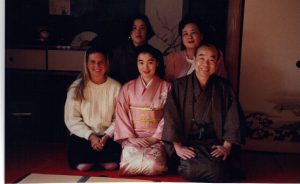
The author with her Japanese host family,
Oshogatsu (New Year’s Day), 1994
When I was eight years old, my mom moved from our home, outside of Philadelphia, Pennsylvania, to start a new life for herself in Los Angeles, California.
Growing up on the East Coast of the US, in the 1970’s, I had been exposed to only small pockets of Asian, immigrant populations; I knew nothing of the large, well-established Asian populations out on the West Coast.
On one of my first trips out to visit, my mom took me to an area of Los Angeles called Little Tokyo. As its name infers, it was a predominantly Japanese neighborhood and wandering around its streets made me feel like I had been transported to a different land.
I can’t remember if I had ever had sushi before my visit but certainly I had never experienced sushi in as authentic a setting as the restaurant she took me to that day.
The entrance involved crossing a wooden bridge over a small koi pond. There were stone lanterns and bonsai trees. the waitresses were all clad in kimono and the sushi arrived at our table on small wooden planks. I was mesmerized. For me, it was love at first…bite.
This experience had such an impact on me that, from that day on, I was enthralled by anything Japanese. I wanted to know everything I could about the country, culture and its people.
The Japanese were the great inventors of all things prominent in my childish memory: Iron Man, Godzilla, Kero-Kero Keroppi, Hello Kitty, my first Walkman. What a genius tribe they must be!
The rise of my curiosity coincided perfectly with the rise of the Japanese economy. Access to their food, products and even language grew increasingly accessible.
When I was in high school, a small group of students expressed their desire to study Japanese, a language option not yet offered at my school. Fortunately for us, since our school was less than an hour from Yale University—one of the US’s leading colleges—we petitioned for and received permission to get transportation to Yale one evening a week, so we could take an introductory-level Japanese language class there.
When I began researching colleges the following year, I selected only those with an established Japanese language program and study abroad opportunities.
I ended up at a small, liberal arts college in Tennessee with a strong International Studies department. I enrolled in every Japanese class they offered. In my sophomore year, I applied for and was accepted into my school’s Japanese exchange program with our sister university in Osaka, Japan.
At the end of my sophomore year, when all students had to declare their majors, I–along with one other student–petitioned for and was granted permission to develop the school’s first degree track in Japanese Studies. It seemed an auspicious plan, considering the Japanese purchase of the iconic, US landmark, Rockefeller Center, earlier that same year.
I spent my entire junior year of college abroad, studying at a Japanese university, living with two separate Japanese families and absorbing as much of the country and culture as possible for a college-aged kid.
I turned 21 there, a major American coming-of-age. I participated on Japanese sports teams, took painting and pottery classes, studied the culture through the fascinating lens of manga (Japanese comics), dated only Japanese men and immersed myself in the pursuit of understanding all things Japanese.
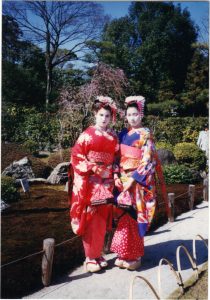
The author and her host sister dressed in kimono
My study abroad experience had an unbelievable impact on my life. It launched my passion and insatiable hunger for travel and Asia, beyond Japan.
I gained greater independence, broadened my global perspectives, forged life-long friendships, developed cultural empathy and experienced life as a minority; a gaijin (outsider) in a homogeneous land.
I consider my study abroad experience the foundation of the life I built upon it. I know that many of us here at World Moms Blog also have had experiences living and studying abroad; it is one of the many ties that bind us. We are global citizens striving to raise our own children in an increasingly globalized world.
But, as you will learn later today from World Moms Blog Founder, Jennifer Burden, here in the US, accessibility to and enthusiasm for studying abroad are not as prevalent as many of us may think.
So what’s it like in your country? Are study abroad programs prolific on your college campuses? Did you benefit from studying abroad? Tell us about what the experience means to you.
And stay tuned later today for Jen’s post on Studying Abroad and how the White House is playing a part…
This is an original post to World Moms Blog from our managing editor and mother of two rising, global citizens, Kyla P’an.
The pictures used in this post are credited to the author.
Kyla was born in suburban Philadelphia but spent most of her time growing up in New England. She took her first big, solo-trip at age 14, when she traveled to visit a friend on a small Greek island. Since then, travels have included: three months on the European rails, three years studying and working in Japan, and nine months taking the slow route back from Japan to the US when she was done. In addition to her work as Managing Editor of World Moms Network, Kyla is a freelance writer, copy editor, recovering triathlete and occasional blogger. Until recently, she and her husband resided outside of Boston, Massachusetts, where they were raising two spunky kids, two frisky cats, a snail, a fish and a snake. They now live outside of Lisbon, Portugal with two spunky teens and three frisky cats. You can read more about Kyla’s outlook on the world and parenting on her personal blogs, Growing Muses And Muses Where We Go
More Posts - Website
Follow Me:

by Mama B (Saudi Arabia) | Nov 26, 2014 | Adolescence, Awareness, Boys, Brothers, Culture, Education, Eye on Culture, Family, Gender, Girls, Husband, International, Life Lesson, Motherhood, Older Children, Parenting, Puberty, Relationships, Saudi Arabia, School, Teenagers, Womanhood, World Motherhood
I grew up in a house full of girls with one baby brother, who was so much younger than me that our friends and social lives didn’t overlap.
Now that I am the mother of three boys and one girl, I am learning many things I never knew about boys: they are more straightforward, easier to read, and, honestly, easier to persuade than girls. Boys wrestle–a lot. Even when they haven’t got the hang of walking yet, they wrestle. (I still don’t know why.) Boys are more emotional than I expected, and more sensitive.
I know there’s a lot more to learn about raising boys, and I’m excited to do it–especially because I can call in their father whenever something freaks me out.
Despite my growing expertise in raising boys, something recently caught me off guard. Something obvious in our society, but not so prevalent in my ‘tribe’ (which is what I call my close family–mother, father, aunts, uncles, cousins, etc.).
My eldest turned 11 this year, and is in the phase between boy and teenager. And I find myself surprised to discover that our society’s segregation of men and women is changing my relationship with my own son.
I was totally unprepared for the separation that occurred when he moved from the little school to the big school. I went from being able to walk into his class, to speak to his teacher, and to meet his friends and their moms, to having to drop him off and pick him up outside the school gate (but not right in front of it, where the other boys could see us).
No more going into the school, unless I make an appointment with the headmaster and go to his office to speak with the teachers. (And even that is not permissible in most boys’ schools, the majority of which would not even allow a woman on the premises. The same is true for girls’ schools, which don’t permit men on the premises.)
My son can no longer go into the all-women area of the malls. In a few years, he won’t be allowed in any area of the mall without a ‘family’ for fear he will terrorize the girls. (Ironically, some young teenagers wait outside the malls and approach older women, or women with children, and ask them to pretend they are one family to gain entrance into the mall.)
Soon, my son won’t invite his friends over when his sister is home, although he could still invite cousins and close family friends.
There are so many unwritten rules concerning the separation of girls and boys, and a million variations. For some families, it’s pretty black and white: unless he is your brother or father, or unless she is your sister or mother, you don’t spend time with them. It also depends upon the region. In the eastern or western provinces, strict segregation is not as prevalent as it is here in the central region. In seacoast areas, people have the benefit of interacting with many cultures, and are therefore more forgiving.
I am baffled by how our society has become so segregated. Throughout the early history of Islam, segregation wasn’t practiced. Modesty and chastity, yes. Total segregation, no. I do not even think it was part of our culture as Saudis. At least, not to the extent it is today.
Until recently, Bedouin women were expected to welcome travelers into their tents, and to make them coffee, and even dinner, regardless of whether her husband was there. Yes, most would have had their faces covered (again, a cultural custom, not religious one), but they interacted with men all the time. It’s only in recent years that things have changed. Some put it down to the influences that came into Saudi when it was united. Others say it is a reaction to how fast we were exposed to the outside world, and how quickly we went from tribal life to modern-day life.
Theories aside, I’m facing the reality of being shut out of a part of my son’s life and of him being shut out of mine.
When I explained my concern to one of his teachers (over the phone) he said, “You can’t follow him around all of his life!” As if I were a stalker! Am I being a stalker? Hmmm, I wonder how involved I would be in his day-to-day school life if I were?
My biggest fear is that if he gets caught up in the wrong crowd, segregation makes it easier in certain houses with absent fathers to make mistakes and do stupid stuff. I thank God his father keeps an eye on him, and that he still fills me in about his day and talks to me when he is upset. If we can continue to talk, I think I may be okay.
Perhaps I just don’t like not being in control of the situation, or perhaps it’s that I don’t have the choice.
Would you naturally step back from your son’s day-to-day life when he turns 11 or 12? Would you withdraw from knowing his friends and supervising his outings?
It’s all foreign territory for me now, and I am learning to deal with it as best I can.
This is an original post to World Moms Blog from our contributor in the Kingdom of Saudi Arabia and mother of four, Mama B.
Photo credit: Dr. Coop under Flickr Creative Commons License

Mama B’s a young mother of four beautiful children who leave her speechless in both, good ways and bad. She has been married for 9 years and has lived in London twice in her life. The first time was before marriage (for 4 years) and then again after marriage and kid number 2 (for almost 2 years). She is settled now in Riyadh, Saudi Arabia (or as settled as one can be while renovating a house).
Mama B loves writing and has been doing it since she could pick up a crayon. Then, for reasons beyond her comprehension, she did not study to become a writer, but instead took graphic design courses. Mama B writes about the challenges of raising children in this world, as it is, who are happy, confident, self reliant and productive without driving them (or herself) insane in the process.
Mama B also sheds some light on the life of Saudi, Muslim children but does not claim to be the voice of all mothers or children in Saudi. Just her little "tribe." She has a huge, beautiful, loving family of brothers and sisters that make her feel like she wants to give her kids a huge, loving family of brothers and sisters, but then is snapped out of it by one of her three monkeys screaming “Ya Maamaa” (Ya being the arabic word for ‘hey’). You can find Mama B writing at her blog, Ya Maamaa . She's also on Twitter @YaMaamaa.
More Posts

by ThinkSayBe | Nov 14, 2014 | 2014, Communication, Discipline, Divorce, Education, Girls, Homeschooling, Kids, Older Children, Parenting, ThinkSayBe, USA, World Motherhood, Younger Children
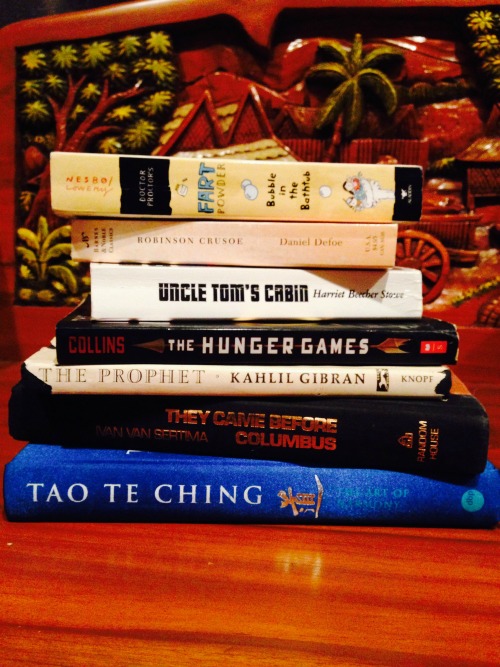 Over the past ten years, my daughter has read quite a few books. She started reading books like The Berenstain Bears series when she was two or three years old; it was a favorite activity to do with her grandma.
Over the past ten years, my daughter has read quite a few books. She started reading books like The Berenstain Bears series when she was two or three years old; it was a favorite activity to do with her grandma.
By age six she was really into the Magic Tree House series, devouring them as soon as she got them home. She also had some strange requests at age six, like the book Growing Up in Mississippi. Personally, I thought that was a fine book for her to read, except for the third part which talks about the main character’s high school years (and experiences that accompany that time of life).
Of course I was in mom heaven, having a child who was such an avid reader. Her interest in reading spilled over into school, and she participated in various reading programs, and won some medals; which she absolutely loved.
The majority of the books she has read since age six have either been on a required school list of readings, suggested readings, part of a competition (like Battle of the Books), or popular books approved by her peers and teenagers (e.g. The Hunger Games).
Two years ago we told her that she needed to read some classics as well.
We explained that there is at least one reason why certain books are internationally recognized, and how books like The Hunger Games are partially a product of these classics’ influence on the new authors. My assignment for her (as a part of homeschool) was to read Frederick Douglass, a child-friendly version of The Hunger Games.
Her father’s assignment immediately after Frederick Douglass was The Lord of the Flies. She lives with her dad on weekends, but there was no escaping this reading ‘thing’ her parents were making her do! Poor girl! No breaks on weekdays or weekends.
I really tried to get her to enjoy reading Frederick Douglass. She and I talked about American history and how this book was about overcoming enslavement, and that it was important for her to read this as an African-American girl. I told her she could read whatever she wanted when she was finished, or even read a book of her choice simultaneously with this one. Nothing worked. She went from reading a book a week, to taking six months to finish Frederick Douglass’ biography. Lord of the Flies took a year for her to finish, and she really did not enjoy reading it.
After these two parent ‘fails’, I really just wanted her to read. I wanted her to rekindle the passion she had for reading and so I let her read almost whatever she liked. Her choices are actually pretty good. Some books have deep moral meanings, and some just talk about fun stuff like fart powder for the bathtub.
We used to keep books organized by content, but now we have shelves that carry books about varying subjects. By doing this, we hope that while she’s looking for a book to read, her eye may be caught by East Africa’s History, or The Prophet, or The Human Body, or something else she wouldn’t typically think she’d like.
Do you have a set of boundaries on what your child/ren can read? If so, what do you base it on? Have you tried to introduce different books to your child/ren? If so, how were they received?
This is an original post to World Moms Blog by Sophia. You can find her blogging at Think Say Be and on twitter @ThinkSayBeSNJ.
Photo credit to the author.
I am a mom amongst some other titles life has fortunately given me. I love photography & the reward of someone being really happy about a photo I took of her/him. I work, I study, I try to pay attention to life. I like writing. I don't understand many things...especially why humans treat each other & other living & inanimate things so vilely sometimes. I like to be an idealist, but when most fails, I do my best to not be a pessimist: Life itself is entirely too beautiful, amazing & inspiring to forget that it is!
More Posts
Follow Me:

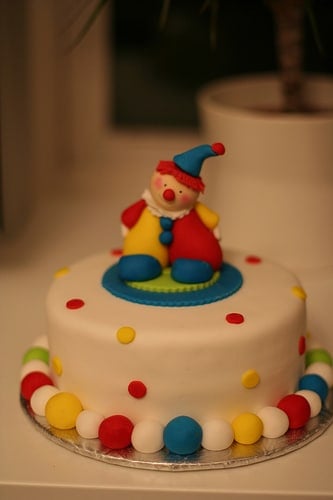
by Ecoziva (Brazil) | Nov 12, 2014 | 2014, Awareness, Brazil, Childhood, Cultural Differences, Entertainment, Family, International, Kids, Life Lesson, Milestones, Moving, Nutrition, Relationships, Stress, Tragedy, World Motherhood
This is the second post of a two-part series. To read part I of this post, please click here
 It was my fourth birthday party. Since we were moving to Brazil soon, it was also a farewell party, and a big one. It was the only big birthday party I have had in my entire life. I remember it was held at some sort of club, there were a lot of people and a hired caterer (something almost unthinkable for my mother!) And then there was the clown. And he wanted to paint my face.
It was my fourth birthday party. Since we were moving to Brazil soon, it was also a farewell party, and a big one. It was the only big birthday party I have had in my entire life. I remember it was held at some sort of club, there were a lot of people and a hired caterer (something almost unthinkable for my mother!) And then there was the clown. And he wanted to paint my face.
I was completely and irrationally terrified as only a four-year-old can be. While most of the other children were loving it all, I wanted nothing to do with the clown and his face paint (and certainly not on my face!). My party was ruined. In fact, I hid in the kitchen the entire time.
I don’t know exactly who stayed with me in the kitchen, but I don’t think it was either of my parents – at least not all of the time. Of course they were probably running around organizing things and tending to the guests. What really comforted me at that moment was the food, more specifically the dozens of intricately decorated mini-ice cream cakes. I recall later telling someone that the good side of the party was that I had stayed close to the food the entire time.
Although I hadn’t thought of it in a while, this story is not something that had been forgotten or hidden in my mind, as it has been told and retold over the years by my mother. The interesting detail that came up now was that of the ice cream cakes. When I remembered the ice cream cakes I felt like I could eat a ceiling-high pile. I felt like I had been looking for them my entire life. It was such a visceral craving it felt like nothing else could fill up my void except for those ice cream cakes. Right now writing this I want those ice cream cakes so badly it almost hurts.
It is interesting because here in Brazil ice cream cakes are rare – I believe I have only seen them for sale once in the more than 30 years I have lived here. I don’t know why this particular detail only came up so strongly now, nor what has been triggering this strong need for comfort and protection, which originally was a need to be shielded from someone scary (the clown) who wanted to do something I did not want to do (paint my face).
I don’t know if this is related, but it is also funny because I was never a big fan of makeup. Also, once when I was six and went through a brief period of interest for makeup, I got a kit of child makeup and ate several of the flavored lipsticks that came with it!
Perhaps this story will bring about significant change in my relationship with food, perhaps not, but it does bring up several issues related to my relationship with my own children.
For instance, it has reminded me that no matter how I try, it is impossible to protect them from every traumatic incident or foresee the lasting effect of seemingly small events on their lives. On the other hand, it is also a strong reminder not to belittle the things that upset them – what might seem insignificant or minor to me may be a huge deal to them and I must give them the best emotional support we can at all times.
Please share your stories about your relationship with food. Do you interfere in your children’s relationship with food? Do you actively foster a healthy relationship with food in your home?
This is the continuation of an original post to World Moms Blog published by our writer in Brazil and mother of three, EcoZiva. You can read Part I here.
The image in this post is credited to Chris Martin. It holds a Flickr Creative Commons attribution license.
Eco, from the greek oikos means home; Ziva has many meanings and roots, including Hebrew (brilliance, light), Slovenian (goddess of life) and Sanskrit (blessing). In Brazil, where EcoZiva has lived for most of her life, giving birth is often termed “giving the light”; thus, she thought, a mother is “home to light” during the nine months of pregnancy, and so the penname EcoZiva came to be for World Moms Blog.
Born in the USA in a multi-ethnic extended family, EcoZiva is married and the mother of two boys (aged 12 and three) and a five-year-old girl and a three yearboy. She is trained as a biologist and presently an university researcher/professor, but also a volunteer at the local environmental movement.
More Posts

by Kirsten Doyle (Canada) | Nov 7, 2014 | 2014, Awareness, Boys, Canada, Communication, Girls, Kids, Parenting, Rape, Relationships, Respect, Sex, Sexual Assault, Sexuality, Women's Rights, World Motherhood
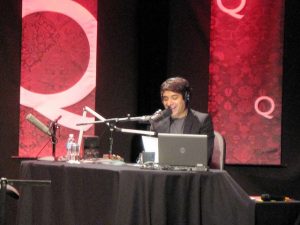 It’s not often that I get riled up over things that happen in the news, especially in Canada. Yes, we have some outrageous things happening here, but for the most part, Canadian society is reasonably civilized.
It’s not often that I get riled up over things that happen in the news, especially in Canada. Yes, we have some outrageous things happening here, but for the most part, Canadian society is reasonably civilized.
However, a story that’s currently unfolding has me feeling a little sick. It is the story of Jian Ghomeshi, a popular radio show host who has just been fired amid a storm of allegations. (more…)

Kirsten Doyle was born in South Africa. After completing university, she drifted for a while and finally washed up in Canada in 2000. She is Mom to two boys who have reached the stage of eating everything in sight (but still remaining skinny).
Kirsten was a computer programmer for a while before migrating into I.T. project management. Eventually she tossed in the corporate life entirely in order to be a self-employed writer and editor. She is now living her best life writing about mental health and addictions, and posting videos to two YouTube channels.
When Kirsten is not wrestling with her kids or writing up a storm, she can be seen on Toronto's streets putting many miles onto her running shoes. Every year, she runs a half-marathon to benefit children with autism, inspired by her older son who lives life on the autism spectrum.
Final piece of information: Kirsten is lucky enough to be married to the funniest guy in the world.
Connect with her on Facebook, Twitter and Instagram.
Be sure to check out her YouTube channels at My Gen X Life and Word Salad With Coffee!
More Posts
Follow Me:




by Patricia Cuyugan (Philippines) | Oct 23, 2014 | 2014, Awareness, Being Considerate, Being Thankful, Caring, Family, Friendship, Health, Home, Inspirational, Life, Life Balance, Maternal Health, Me-Time, Mental Health, Motherhood, Philippines, Time, Womanhood, Working Mother, World Motherhood
 I was recently given the incredible opportunity to attend a life coaching seminar about investing in yourself. Truth be told, this wasn’t a subject that I had put any serious thought into before that day.
I was recently given the incredible opportunity to attend a life coaching seminar about investing in yourself. Truth be told, this wasn’t a subject that I had put any serious thought into before that day.
Our speaker, the amazing Coach Pia from the One Core Group here in the Philippines, shared five aspects that we must be able to balance in our lives:
- Family
- Work
- Social Life
- Sense of Purpose
- Self
After a quick assessment, I discovered that I may not have this whole life-balance thing in order. And I’m pretty sure that I am not alone. We all know that it isn’t easy to do this when you’re a mom.
Family, a.k.a. my son and my husband, comes first. Next focus is our home – making sure we are safe and secure, that we have food to eat, that bills are paid, and all of those other adult responsibilities. Work is after that, because as a work-at-home mom, I have taken it upon myself to contribute to the family finances. I am confident that each day is lived in fulfillment of my sense of purpose, so I get a check there. As for my social life, well it’s better now, and I do get to chat with many friends online every day. I also spend time with parents at school, and with neighbors and childhood friends as often as I can. So I guess that leaves just the “self” aspect.
How exactly have I invested in myself throughout the years? And why have I not asked myself this question before? My wake-up call came when this one powerful line was flashed onscreen before us:
What you invest in yourself influences your ability to succeed, to lead others and to make a difference.
We moms need to start investing in what Coach Pia calls our Hero Currency. This is the capacity to give of ourselves, armed with our talents, skills, and the enthusiasm we have for life. It consists of our commitment to personal growth, our ability to identify and accept our strengths and weaknesses, and our capacity to make the best decisions we can in every situation.
With every positive experience, you earn Hero Credits. These include monumental ones, like your child graduating or the day you were married, and little everyday victories too, like scoring an amazing parking space in the mall or choosing a salad over a slice of pizza for lunch. Things that have a negative impact on your life, like getting stuck in traffic jams or screaming at your child in anger, take away from your Hero Credits.
Assess your day and do the accounting. How much positivity do you put into your days, and how much of it is filled with negativity? Do you allow yourself to do things that fill up your Hero Credits, and balance out or even cancel out the daily negatives?
After this exercise, I discovered that investing in my self relies heavily on my perspective. I have to understand that success, whether big or small, begins with me.
I have to be able to gain focus, to sometimes just be silent and evaluate the decisions that I have made. I have to be able to identify my feelings and understand the reasons behind them. It is only then that I will be able to figure out how to convert my daily negatives into positives. I need to be able to open up to others and show vulnerability so that I can freely express love and concern. And I have to be able to work without seeking recognition and find total fulfillment within my self.
At the end of the session, I came to this striking realization: I have been investing in myself. The fulfillment and happiness that I get out of how I choose to live my life far outweighs any sadness or disappointment I may come across. Somewhere along the way of raising my family and creating a home, I managed to do something right for myself, too. I suppose that this means that I am exactly where I want to be in life, that I am surrounded by love, happiness, and acceptance. This realization really fills my heart with joy, and it is something that I wish for moms all over the world, too.
So, World Moms, are you ready to start investing in you? Then ask yourself this:
Where are you in terms of self-growth? Where do you want to be?
This is an original post to World Moms Blog from our writer in the Philippines, Mrs. C.
The image used in this post is credited to SweetOnVeg. It holds a Flickr Creative Commons attribution license.
Patricia Cuyugan is a wife, mom, cat momma, and a hands-on homemaker from Manila, whose greatest achievement is her pork adobo. She has been writing about parenting for about as long as she’s been a parent, which is just a little over a decade. When she’s not writing, you can usually find her reading a book, binge-watching a K-drama series, or folding laundry. She really should be writing, though! Follow her homemaking adventures on Instagram at @patriciacuyugs.
More Posts
Follow Me:









 Over the past ten years, my daughter has read quite a few books. She started reading books like The Berenstain Bears series when she was two or three years old; it was a favorite activity to do with her grandma.
Over the past ten years, my daughter has read quite a few books. She started reading books like The Berenstain Bears series when she was two or three years old; it was a favorite activity to do with her grandma.











